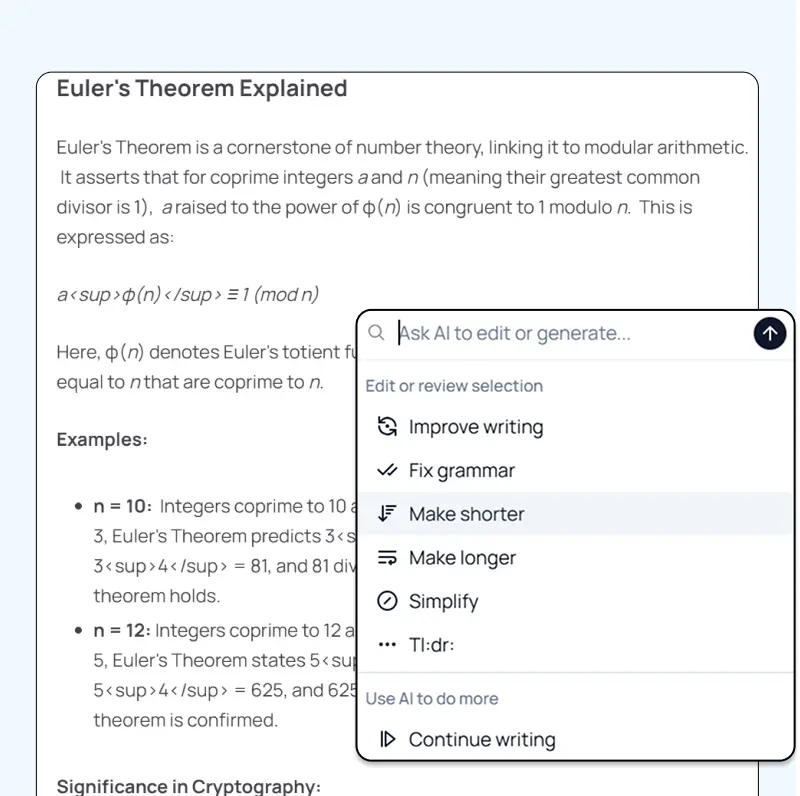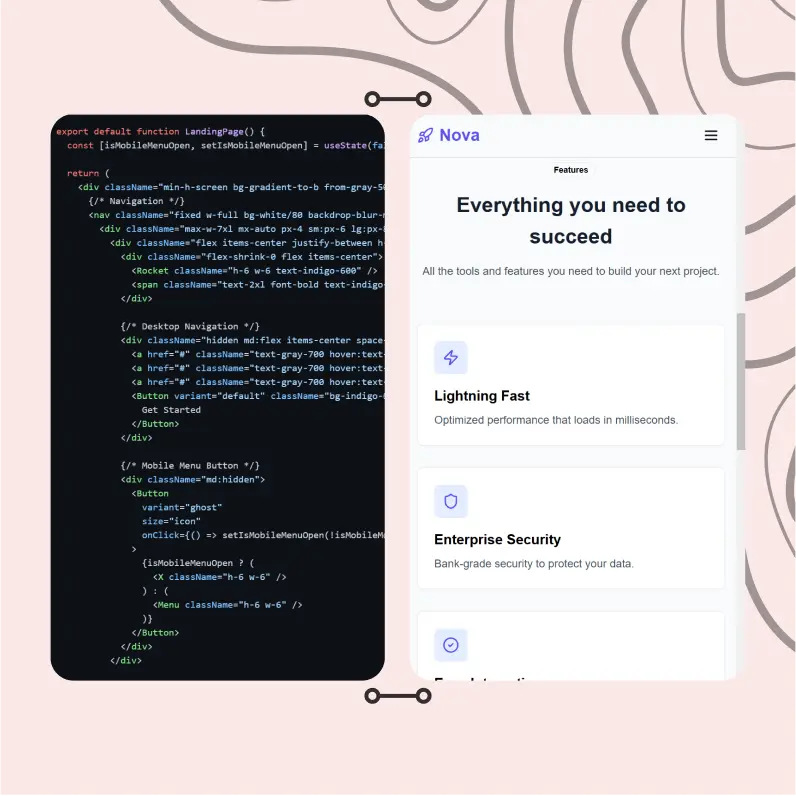
AI Voice Assistants: 2024 Guide
AI voice assistants are now essential tools in our daily lives. Here's what you need to know:
- What they are: AI-powered programs that understand and respond to voice commands
- Top players: Google Assistant, Amazon Alexa, Apple Siri
- Key features: Set reminders, answer questions, control smart homes, play music, send messages
- How they work: Use speech recognition, natural language processing, and text-to-speech technology
- 2024 updates: Better conversations, smarter home control, improved privacy features
- Usage: 8 billion+ devices, 50% of internet searches are voice-based
- Challenges: Privacy concerns, accent recognition, complex task handling
Quick Comparison:
| Feature | Google Assistant | Amazon Alexa | Apple Siri |
|---|---|---|---|
| Accuracy | 92% | Not specified | 75% |
| Smart Home | Good | Excellent | Limited |
| Privacy | Cloud-based | More cloud reliance | Strict on-device |
| Ecosystem | Amazon | Apple | |
| Strengths | Info retrieval, context | Smart home, shopping | Simple tasks, privacy |
AI voice assistants are becoming more human-like, with better conversation abilities and emotional recognition. As they evolve, they're set to play an even bigger role in our lives, both at home and work.
Related video from YouTube
How AI Voice Assistants Work
AI voice assistants use complex tech to understand and respond to our commands. Here's how they work:
Key Technologies
AI voice assistants rely on three main technologies:
- Speech Recognition: Turns your voice into text
- Natural Language Processing (NLP): Understands what you mean
- Text-to-Speech: Converts responses back into spoken words
These work together to make voice assistants useful. When you ask Alexa to play a song, it uses speech recognition to hear you, NLP to understand you want music, and text-to-speech to confirm your choice.
Processing Commands
When you speak to a voice assistant, it:
- Detects wake words like "Hey Siri"
- Converts your speech to text
- Figures out what you want
- Takes action or finds an answer
- Speaks back to you
Here's how it works:
| Step | What Happens | Example |
|---|---|---|
| Wake Word | Assistant activates | You say "Hey Siri" |
| Speech-to-Text | Your words become text | "What's the weather like?" |
| Understanding | Assistant interprets request | Knows you want a weather report |
| Action | Assistant checks data | Looks up your location's forecast |
| Response | Assistant tells you | "It's sunny and 75°F today" |
Voice assistants are improving. Google's working on tech for people with speech problems, and Amazon's made speakers that understand sign language.
"Today's AI engineers are making remarkable strides toward developing smart speakers that are able to recognize all these forms of speech." - Charly Walther, VP of product and growth at Lionbridge
Top Voice Assistants in 2024
Google Assistant, Amazon Alexa, and Apple's Siri dominate the AI voice assistant market in 2024. Each has its own strengths:
Google Assistant
- Nails follow-up questions without repeating yourself
- Taps into Google's massive knowledge base
- Gets context like a champ
Amazon Alexa
- Rules the US smart speaker market
- Works with a ton of smart home gadgets (140,000+)
- Crushes it for shopping and music
Apple Siri
- Apple-exclusive, plays nice with iOS
- Big on privacy (most stuff stays on your device)
- Aces simple tasks on Apple gear
Here's how they stack up:
| Feature | Google Assistant | Amazon Alexa | Apple Siri |
|---|---|---|---|
| Accuracy | 92% | Not specified | 75% |
| Smart Home Compatibility | Good | Excellent (140,000+ devices) | Limited (about 600 devices) |
| Privacy | Cloud-based | More cloud reliance | Strict on-device |
| Ecosystem | Amazon | Apple | |
| Strengths | Info retrieval, context | Smart home, shopping | Simple tasks, privacy |
Picking your assistant? Think about:
- Your smart home setup
- Which ecosystem you're into
- What you'll use it for most
Got a house full of smart gadgets? Alexa might be your best bet. All about that Apple life and privacy? Siri's got your back.
New Features in 2024
AI voice assistants got a major upgrade in 2024. They're now better at talking and controlling your smart home. Here's what's new:
Better Conversations
Voice assistants now get context, making chats feel more human:
- Google's Gemini Live: Talk to AI across apps or with your phone locked. Choose from 10 AI voices.
- Microsoft's Copilot: Chats like a friend. Yusuf Mehdi from Microsoft says: "We're making a huge bet on voice."
These upgrades make assistants more useful:
| Task | Feature |
|---|---|
| News | Copilot reads headlines |
| Briefings | Copilot Daily gives audio news and weather |
| Emails | Gemini Live summarizes emails by voice |
Smarter Home Control
Voice assistants are better at running your smart home:
- Works with more devices
- Learns your habits for smarter automation
- Copilot can "see" your screen to help with visual tasks
These features are still growing. Sam Altman from OpenAI hints at more: "excited to make even more progress from this devday to the next one. the path to agi has never felt more clear."
To make the most of these new features:
- Check which of your smart devices work with your assistant
- Try new features to improve your daily routine
- Keep an eye on privacy settings
Privacy and Security
Voice assistants like Alexa, Google Assistant, and Siri are everywhere. But their always-on nature raises eyebrows about privacy and data security.
Data Collection and Use
These devices are ALWAYS listening for wake words. This can lead to some unexpected recordings. Here's the scoop:
- They only start recording after hearing wake words
- They collect voice recordings, usage patterns, and sometimes location data
- Your recordings get sent to servers for analysis and storage
"It's the marketer's dream to have all the personal data in one place, but it's also the cybercriminal's dream." - Tony Anscombe, ESET
Most users don't know how much data these devices collect:
| Statistic | Percentage |
|---|---|
| Unaware of constant listening | 49% |
| Never improved privacy | 68% |
| Feel in control of data | 57% |
Keeping Things Secure
Companies have added security features, but risks still exist:
- Google Home can recognize authorized voices
- Companies claim to remove personal info from recordings
- Data is usually encrypted during transmission and storage
But things can go wrong:
- In 2019, Google contractors accessed sensitive audio recordings
- Amazon paid $25 million in 2023 for violating child privacy laws
Want to protect your privacy? Try these:
- Check your privacy settings often
- Delete voice recordings regularly
- Use the mute button
- Turn on two-factor authentication
- Be careful about sharing sensitive info through voice commands
"Only use a virtual personal assistant in the cases where it's not sharing personal data." - Tony Anscombe, ESET
As these devices evolve, stay informed about privacy policies and security updates to keep your personal info safe.
sbb-itb-4f108ae
Setting Up Your Voice Assistant
Let's get your AI voice assistant up and running. It's easier than you think.
Which Devices Work
Voice assistants work on:
- Smart speakers
- Smartphones and tablets
- Computers
- Smart home devices
Look for "Works with Google Assistant" or "Works with Alexa" labels to check compatibility.
Making It Work Better for You
1. Initial Setup
For Amazon Echo:
- Plug in, wait for blue light
- Download Alexa app
- Hold Action button until orange light
- Follow app prompts
For Google Home:
- Plug in
- Download Google Home app
- Tap "+" in app
- Choose "Set up device" and follow instructions
2. Customize Your Experience
| Setting | How to Adjust | Benefit |
|---|---|---|
| Voice ID | App settings | Better recognition |
| Wake Word | App settings | Personal activation |
| Language | App settings | Preferred language |
| Voice Speed | App settings | Clearer responses |
3. Enhance Privacy and Security
- Use a strong account password
- Turn on two-factor authentication
- Check privacy settings often
4. Connect Smart Home Devices
Google Home app:
- Tap "+" > "Set up device" > "Works with Google"
- Find your device brand and link it
Alexa app:
- Go to "Devices" > "+" > "Add Device"
- Pick device type and follow prompts
5. Fine-tune Performance
- Put device in open area
- Speak clearly at normal volume
- Update app and device regularly
How People Use Voice Assistants
AI voice assistants are now part of many people's daily lives. Here's how they're used at home and work:
Personal Use
Voice assistants make life easier:
- Smart home control: "Alexa, turn on the lights" or "Hey Google, set thermostat to 72"
- Shopping lists: "Alexa, add milk to my list"
- Music and entertainment: Play songs, podcasts, or audiobooks with a command
- Quick info: Get weather, sports scores, or answers to questions
- Scheduling: Set alarms, create events, and get reminders by voice
Fun fact: Nearly 105 million people in the US use smart speakers for music and entertainment monthly in 2024.
Business Use
Companies are getting creative with voice assistants:
| Company | Use Case | Benefit |
|---|---|---|
| New York Life Insurance | Agents access policy info via Alexa | Faster client service |
| JP Morgan & Co | Provide research reports through Alexa | Easy access to analytics |
| Capital One | First US bank with Alexa banking | Convenient voice banking |
Other business uses:
- Meetings: Schedule, send invites, take notes
- Customer service: Handle basic inquiries
- Productivity: "Hey Cortana, ask HP Tango to print my calendar"
But there's room for growth. Less than half of smart speaker owners use them regularly. As the tech improves, we'll likely see even more uses at home and work.
Problems and Issues
AI voice assistants have made progress, but they're not perfect. Let's dive into their limitations and the ethical questions they raise.
Current Limits
Voice assistants still struggle with:
- Accents: They misunderstand 23% of UK accents, with Welsh being the toughest.
- Bilingual users: Chinese and Spanish speakers often face difficulties.
- Complex tasks: They can set alarms but can't handle complicated requests.
These issues mean many people don't use their voice assistants regularly. In fact, less than half of smart speaker owners use them often.
Ethical Questions
1. Privacy worries
People are concerned about being recorded. It's not just paranoia:
- Amazon got hit with a $25 million FTC fine for keeping kids' voice data.
- Ring (Amazon-owned) paid $5.8 million for letting employees peek at users' private videos.
A Voicebot.ai survey found 33% of U.S. adults won't buy voice assistants due to recording fears.
2. Gender bias
Most voice assistants use female names and voices, which can reinforce stereotypes:
UNESCO reported it "sends the signal that women are obliging, docile, and eager-to-please helpers."
Siri used to respond to sexist comments with "I'd blush if I could." Now it says "I won't respond to that."
3. Impact on real people
The name "Alexa" has had unexpected effects:
- More bullying of children named Alexa.
- The name's popularity dropped from 6,000 newborns to 1,300 in 2020.
Lauren Johnson, founder of "Alexa is a Human", said: "The word Alexa has become synonymous with servant or slave. It gives people a license to treat people with the name Alexa in a subservient manner."
4. Data collection and use
Companies gather tons of data through voice assistants:
- Amazon's partnership with the UK's National Health Service could lead to tracking users' health inquiries.
- There's growing worry about tech companies sharing data with law enforcement.
As voice assistants become more common, we'll need to keep a close eye on these issues. Companies must balance innovation with user privacy and ethical concerns.
What's Next for Voice Assistants
Voice assistants are getting smarter. Here's what's coming:
More Human-Like Chats
Amazon's Alexa is using AI to make conversations feel natural. You'll be able to:
- Chat about different topics easily
- Use normal language, not just commands
- Have the assistant remember what you talked about before
In a demo, Alexa switched from football to BBQ, then used both to write an invite.
Smarter Homes
You'll control your home more easily. Instead of specific commands, you might just say, "Alexa, I'm cold" to turn up the heat.
Showing Emotions
Voice assistants will:
- Laugh
- Act surprised
- Have more personality
This should make talking to them more fun.
Speaking Multiple Languages
They'll switch languages mid-conversation, great for bilingual users.
Health Helper
Voice assistants might:
- Book doctor appointments
- Give basic medical advice
- Remind you to take meds
Stephen Kowski from SlashNext Email Security+ says:
"Both [Google's Gemini Live and OpenAI's Advanced Voice Mode] push boundaries in emotional recognition, contextual understanding and handling interruptions."
What It Means for You
- More personalized experiences
- Better integration with your daily life
- Easier to use for more people
But remember, these changes also bring up questions about privacy and data security.
Wrap-Up
AI voice assistants are now a big deal. In 2024, they're not just cool tech - they're actually useful.
Here's the scoop:
- 1 in 4 U.S. adults have a smart speaker. That's a lot.
- The market could hit $30 billion by 2024.
- People use them for everything from web searches to turning off lights.
- Businesses are jumping on board too, using voice tech to up their game.
- Privacy's a hot topic. Companies are working on it.
- These assistants are getting smarter. They can handle tougher chats now.
- Some can even help with health stuff, like doctor appointments.
What's next? They'll probably become an even bigger part of our lives. They'll understand us better and do more stuff.
But it's not perfect yet. They still struggle in noisy places, and data security is a work in progress.
Stephen Kowski from SlashNext Email Security+ says:
"Both [Google's Gemini Live and OpenAI's Advanced Voice Mode] push boundaries in emotional recognition, contextual understanding and handling interruptions."
This shows voice tech is leveling up, trying to make AI chats feel more natural.
For you, this means:
- More ways to use voice assistants
- Easier smart home control
- Better help with daily tasks
For businesses:
- New customer connection points
- Tools to boost workplace efficiency
- Chances to create voice-enabled products
Keep watching how voice assistants change. They're set to become an even bigger part of our tech lives in 2024 and beyond.
Key Terms Explained
Let's break down some important lingo in the AI voice assistant world:
Voice Assistant: Your digital buddy that understands and responds to voice commands. Think Alexa, Siri, or Google Assistant.
Automatic Speech Recognition (ASR): The tech that turns your words into text. It's how voice assistants "hear" you.
Natural Language Processing (NLP): This is the brain behind understanding what you mean. It's not just about the words, but the intent.
Text-to-Speech (TTS): How voice assistants talk back to you. It's the reverse of ASR.
Smart Speaker: A device with a built-in voice assistant. Amazon Echo and Google Home are prime examples.
Alexa Skills: Think of these as Alexa's apps. They add new tricks to your Amazon assistant.
Voice User Interface (VUI): How you chat with a voice assistant. No buttons or screens needed.
AI Ethics: The rulebook for responsible AI use, including voice assistants.
Chatbot: An AI that can converse with humans. Voice assistants are like chatbots, but they talk instead of type.
Internet of Things (IoT): The network of smart devices that can talk to each other. Voice assistants often play traffic cop in smart homes.
Knowing these terms can help you navigate the voice assistant landscape and stay in the loop on this rapidly evolving tech.
Related posts
Explore Zemith Features
Introducing Zemith
The best tools in one place, so you can quickly leverage the best tools for your needs.
All in One AI Platform
Go beyond AI Chat, with Search, Notes, Image Generation, and more.
Cost Savings
Access latest AI models and tools at a fraction of the cost.
Get Sh*t Done
Speed up your work with productivity, work and creative assistants.
Constant Updates
Receive constant updates with new features and improvements to enhance your experience.
Features
Selection of Leading AI Models
Access multiple advanced AI models in one place - featuring Gemini-2.5 Pro, Claude 4.5 Sonnet, GPT 5, and more to tackle any tasks

Speed run your documents
Upload documents to your Zemith library and transform them with AI-powered chat, podcast generation, summaries, and more

Transform Your Writing Process
Elevate your notes and documents with AI-powered assistance that helps you write faster, better, and with less effort

Unleash Your Visual Creativity
Transform ideas into stunning visuals with powerful AI image generation and editing tools that bring your creative vision to life

Accelerate Your Development Workflow
Boost productivity with an AI coding companion that helps you write, debug, and optimize code across multiple programming languages

Powerful Tools for Everyday Excellence
Streamline your workflow with our collection of specialized AI tools designed to solve common challenges and boost your productivity

Live Mode for Real Time Conversations
Speak naturally, share your screen and chat in realtime with AI

AI in your pocket
Experience the full power of Zemith AI platform wherever you go. Chat with AI, generate content, and boost your productivity from your mobile device.

Deeply Integrated with Top AI Models
Beyond basic AI chat - deeply integrated tools and productivity-focused OS for maximum efficiency
Straightforward, affordable pricing
Save hours of work and research
Affordable plan for power users
Plus
- 10000 Credits Monthly
- Access to plus features
- Access to Plus Models
- Access to tools such as web search, canvas usage, deep research tool
- Access to Creative Features
- Access to Documents Library Features
- Upload up to 50 sources per library folder
- Access to Custom System Prompt
- Access to FocusOS up to 15 tabs
- Unlimited model usage for Gemini 2.5 Flash Lite
- Set Default Model
- Access to Max Mode
- Access to Document to Podcast
- Access to Document to Quiz Generator
- Access to on demand credits
- Access to latest features
Professional
- Everything in Plus, and:
- 21000 Credits Monthly
- Access to Pro Models
- Access to Pro Features
- Access to Video Generation
- Unlimited model usage for GPT 5 Mini
- Access to code interpreter agent
- Access to auto tools
- 10000 Credits Monthly
- Access to plus features
- Access to Plus Models
- Access to tools such as web search, canvas usage, deep research tool
- Access to Creative Features
- Access to Documents Library Features
- Upload up to 50 sources per library folder
- Access to Custom System Prompt
- Access to FocusOS up to 15 tabs
- Unlimited model usage for Gemini 2.5 Flash Lite
- Set Default Model
- Access to Max Mode
- Access to Document to Podcast
- Access to Document to Quiz Generator
- Access to on demand credits
- Access to latest features
- Everything in Plus, and:
- 21000 Credits Monthly
- Access to Pro Models
- Access to Pro Features
- Access to Video Generation
- Unlimited model usage for GPT 5 Mini
- Access to code interpreter agent
- Access to auto tools
What Our Users Say
Great Tool after 2 months usage
simplyzubair
I love the way multiple tools they integrated in one platform. So far it is going in right dorection adding more tools.
Best in Kind!
barefootmedicine
This is another game-change. have used software that kind of offers similar features, but the quality of the data I'm getting back and the sheer speed of the responses is outstanding. I use this app ...
simply awesome
MarianZ
I just tried it - didnt wanna stay with it, because there is so much like that out there. But it convinced me, because: - the discord-channel is very response and fast - the number of models are quite...
A Surprisingly Comprehensive and Engaging Experience
bruno.battocletti
Zemith is not just another app; it's a surprisingly comprehensive platform that feels like a toolbox filled with unexpected delights. From the moment you launch it, you're greeted with a clean and int...
Great for Document Analysis
yerch82
Just works. Simple to use and great for working with documents and make summaries. Money well spend in my opinion.
Great AI site with lots of features and accessible llm's
sumore
what I find most useful in this site is the organization of the features. it's better that all the other site I have so far and even better than chatgpt themselves.
Excellent Tool
AlphaLeaf
Zemith claims to be an all-in-one platform, and after using it, I can confirm that it lives up to that claim. It not only has all the necessary functions, but the UI is also well-designed and very eas...
A well-rounded platform with solid LLMs, extra functionality
SlothMachine
Hey team Zemith! First off: I don't often write these reviews. I should do better, especially with tools that really put their heart and soul into their platform.
This is the best tool I've ever used. Updates are made almost daily, and the feedback process is very fast.
reu0691
This is the best AI tool I've used so far. Updates are made almost daily, and the feedback process is incredibly fast. Just looking at the changelogs, you can see how consistently the developers have ...
